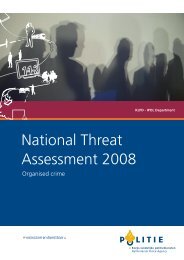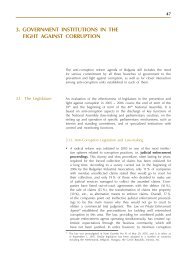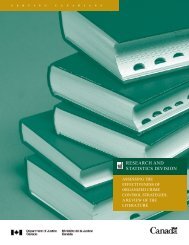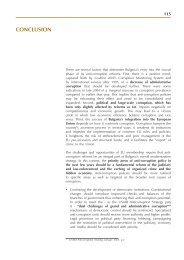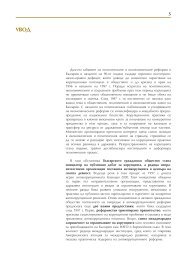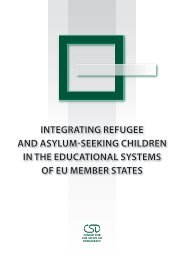5. Civil Society against Corruption (PDF, 293 kb)
5. Civil Society against Corruption (PDF, 293 kb)
5. Civil Society against Corruption (PDF, 293 kb)
You also want an ePaper? Increase the reach of your titles
YUMPU automatically turns print PDFs into web optimized ePapers that Google loves.
114 ANTI-CORRUPTION REFORMS IN BULGARIA<br />
(pupils’ visits to municipality offices, police, court, etc.) which was aimed<br />
at fostering a democratic culture, anticorruption values, etc. through<br />
enhancing the knowledge about the institutions, transparency and good<br />
governance, human and civil rights.<br />
However, efforts to teach anti-corruption to students could be jeopardized<br />
by graft in the very schools and universities. The latter, if they are to<br />
be successful in teaching anti-corruption schools and universities, need<br />
to promote integrity in their administration as well. In 2003, the data<br />
from the Coalition 2000 <strong>Corruption</strong> Monitoring System and other studies<br />
in the area of higher education challenged the assumption that this<br />
public service tended to be less affected by corruption. University faculty<br />
and administrative staff were ranked at one of the leading positions by<br />
amount of corruption pressure exerted. The proportion of those who<br />
have experienced corruption pressure from university teachers ranges<br />
between 12 and 21%, and as regards administrative staff, between 3<br />
and 12% of all who have had contacts with these groups. Besides the<br />
regular monitoring of corruption conducted by Coalition 2000, which<br />
provides information about the scope of the problem in the area<br />
of higher and secondary education, there have been a number of<br />
specific disclosures regarding bribes solicited at universities. A number<br />
of mechanisms have also been identified for corrupt practices – making<br />
students purchase textbooks and other works authored by particular<br />
faculty members; undue payment for administrative services and undue<br />
examination fees; issuing of false diplomas, etc.<br />
As in other areas of anti-corruption reforms, partnership between<br />
government and civil society would be crucial to tackle these<br />
challenges. These should involve both the Ministry of Education, the<br />
administration of state-run and private universities, parents’ associations,<br />
NGOs, regional educational inspectorates and other institutions. There<br />
have been already been some pilot efforts (eg electronic register of<br />
the regulatory framework of education and educational credits) which<br />
should be developed further.



